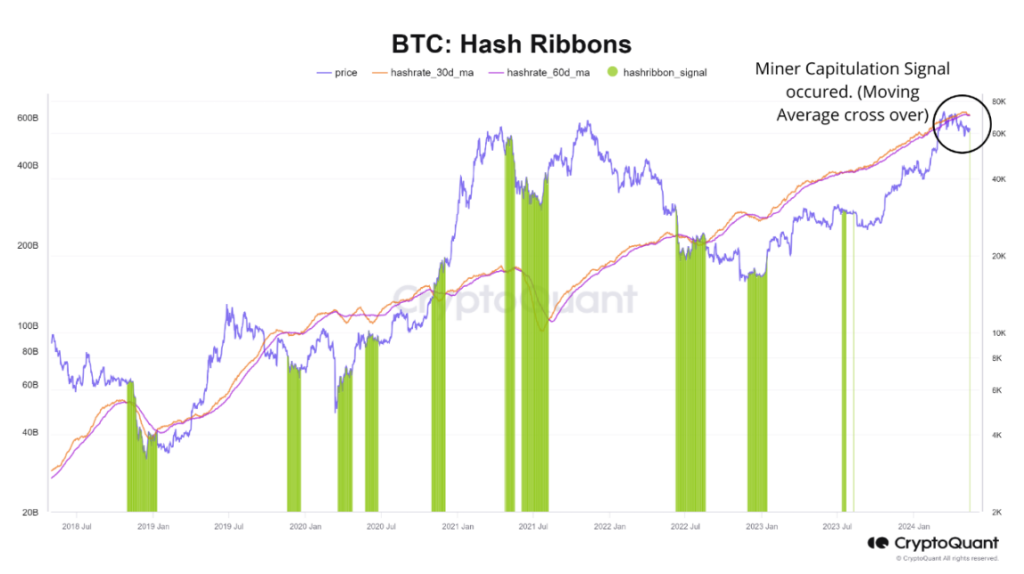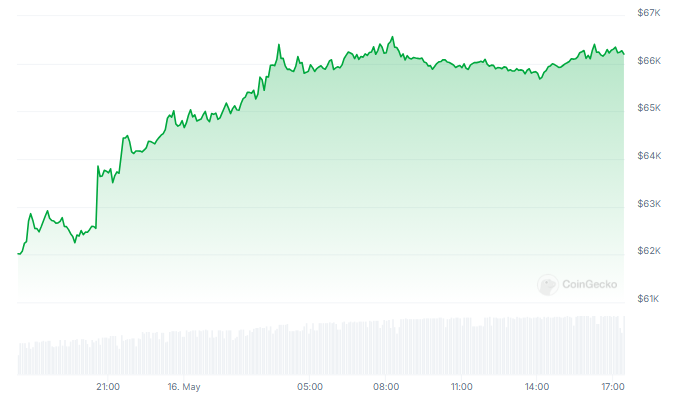The post-halving world of Bitcoin continues to throw curveballs. After a hashrate surge to have fun the block reward discount in April, Bitcoin’s computational energy has taken a nosedive, dropping 20% in recent weeks.
Related Reading
This surprising decline has ignited a debate amongst analysts, with some sniffing out a hearth sale and others urging warning.

Bitcoin: Hashrate Hiccup Or Miner Exodus?
Hashrate, a measure of the mixed processing energy devoted to securing the Bitcoin community, sometimes climbs after a halving occasion as miners spend money on extra highly effective rigs to compete for the diminished rewards.
However, this time round, the development defied expectations. Experts like Maartunn, a pseudonymous analyst at CryptoQuant, consider this alerts a potential “miner capitulation.”
Less environment friendly miners are actually doubtless chucking up the sponge. The halving, which reduce block rewards in half, squeezed revenue margins for miners utilizing older tools. As these miners shut down their operations, the hashrate dips.
Hash Ribbons Flash Warning Sign
Supporting Maartunn’s idea is a technical indicator referred to as Hash Ribbons. This metric tracks the distinction between short-term and long-term hashrate averages. When the hole widens, it suggests a decline in mining exercise, probably resulting from much less environment friendly miners dropping off.
The current hashrate plunge has triggered a spike in Hash Ribbons, traditionally an indication of miner capitulation that has usually coincided with value lows for Bitcoin.

Bitcoin Miners Selling Off?
Further fueling the capitulation idea is a lower in Bitcoin’s Miner Reserve. This metric tracks the quantity of Bitcoin held in wallets related to miners. A decline within the reserve suggests miners is likely to be offloading their mined cash, probably to cowl operational prices or to exit the market altogether.
Undervaluation Signal Or Cyclical Dip?
Maartunn interprets these indicators as a bullish indicator. Hash Ribbons usually level to opportune moments to purchase, he argues. Backing his declare is the Market Value to Realized Value (MVRV) ratio, which suggests Bitcoin is likely to be undervalued.

This metric compares the present market value to the common value at which all Bitcoins have been acquired. A unfavorable MVRV, just like the one Bitcoin at present has, suggests the asset is buying and selling under its historic value foundation, probably indicating a shopping for alternative.
Related Reading
Not Everyone On The Capitulation Train
However, not all analysts are satisfied. Some argue that the hashrate decline might be non permanent, maybe resulting from components like excessive climate occasions disrupting mining operations in sure areas.
Additionally, the post-halving interval is usually considered one of adjustment for miners, and a short-term hashrate fluctuation won’t essentially sign a mass exodus.
The post-halving Bitcoin panorama remains to be unfolding. While the hashrate decline and different indicators counsel a possible shopping for alternative, notably for long-term buyers, the state of affairs stays fluid.
Featured picture from Shutterstock, chart from TradingView


